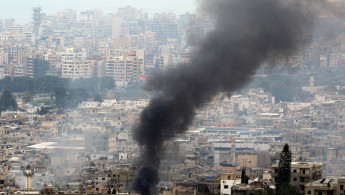Overnight clashes in Lebanon's Ain al-Hilweh Palestinian camp leaves Fatah member dead
A fragile calm reigned over Lebanon’s largest Palestinian refugee camp of Ain al-Hilweh on Thursday, after a night of heavy fighting between rival factions which claimed more lives.
The renewed clashes on Wednesday night were described as the most violent since Saturday, when a truce failed to hold.
One member of the Fatah movement – which is led by Palestinian President Mahmoud Abbas – was reported killed, with several more wounded.
The deceased was identified as Yunus Mustafa Abu Shaqra, who was a member of Fatah’s scout office in Sidon.
Fatah and Islamist groups traded blame for initiating the attack that reignited clashes, reports said.
Palestinian sources told The New Arab’s sister site that calm was holding Thursday morning.
"The situation is currently calm, and the Lebanese army’s measures are continuing. Some entrances to Ain Al-Hilweh camp have been opened and some shops have reopened, but with constant caution and anticipation of what might happen during the day," a source told Al-Araby Al-Jadeed.
Lebanese military and security authorities do not conventionally intervene in Palestinian camps, the security of which is handled by joint Palestinian forces. This has given the chance for extremists and other fugitives to hide in the camps.
Mediation efforts by the Fatah-run Palestinian Authority and other groups including Hamas, as well as Lebanese officials, are trying to reach a ceasefire.
Lebanon’s caretaker Prime Minister Najib Mikati on Thursday slammed the clashes as "a flagrant violation of Lebanese sovereignty," saying the Lebanese people who have long stood by the Palestinian cause – particularly in the south – are currently "terrorised" as violence takes place on their land.
Various types of weapons were used on Wednesday night, when clashes were concentrated mainly in the Al-Baraksat neighbourhood – Fatah’s stronghold in the camp – and the Taware' area, the stronghold of hardline groups.
Some artillery landed outside the camp and reached parts of the Lebanese coastal city of Sidon, to which the camp is adjoined from the southeast.
Lebanese military checkpoints, hospitals and mosques that have served as shelter for thousands of Ain al-Hilweh refugees who fled the fighting are among the places that have been hit by stray bullets.
"The situation today is very calm, and no gunfire has been heard since the early hours of dawn," Dr Riad Abu al-Ainayn from Sidon’s Al-Hamshari hospital told Al-Araby Al-Jadeed.
He said the total death toll had reached 13 with around 60 injured.
The New Arab could not verify this, however several reports have said the same.
"We did not understand what happened yesterday, nor the reason behind the violation of the ceasefire agreement, which all Palestinian forces and groups declared their commitment to," Abu al-Ainayn said.
"There is an exchange of accusations between the parties about who is responsible for violating the armistice," he added.
At least five shells fell for the first time in the vicinity of the Al-Hamshari Hospital he said.
The hospital is located right outside the camp, to the northeast.
Abu al-Ainayn said refugees from Ain al-Hilweh who had to escape the fighting inside the camp have once again had to relocate to other safer places in Sidon, including schools and the nearby Palestinian camp of Mieh Mieh.
Videos shared to social media have shown the large-scale destruction in the camp after days of fighting, with debris and torched cars littering the narrow streets.
حجم دمار مرعب خلفته اشتباكات عين الحلوة.. شاهد صور ومقاطع خاصة من داخل منطقتي "التعمير والصفصاف"#صيدا #لبنان #lebanon #فلسطين pic.twitter.com/oun3G9LcEw
— Sawt Beirut International (@SawtBeirut) August 2, 2023
Translation: The terrifying scale of destruction as a result of the Ain al-Hilweh clashes.. Watch photos and clips from inside the Al-Taameer and Al-Safsaf areas
Ain al-Hilweh, one of 12 Palestinian refugee camps in Lebanon, houses around 50,000 people in an area of roughly 1.5 square kilometres. There are no official numbers for how many Palestinians with refugee status remain in these camps, but they are estimated to be anywhere between 150,000 and 300,000.





 Follow the Middle East's top stories in English at The New Arab on Google News
Follow the Middle East's top stories in English at The New Arab on Google News


